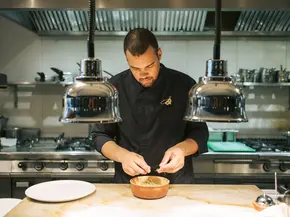CSR
Interview with Emilie Jansingh, Supplier Quality & Laboratory Manager at Elis
Meet Emilie Jansingh, Supplier Quality & Laboratory Manager, speaking about her journey at Elis.

"Establishing lasting relationships with our partners is a key first step in our responsible purchasing approach.
Our objective is to guarantee a balance between the economic performance of our supply chain and the ethical, social and environmental requirements."
What's your position in the company?
I have been the Supplier Quality & Laboratory Manager since April 2020.
What are your challenges in terms of responsible sourcing?
For the Elis Group, control of the supply chain from France and indeed Europe to Asia is a real economic challenge as well as a social, environmental and legal responsibility challenge.
Falling within the scope of the duty of vigilance, the role of the procurement teams and supplier quality manager is to ensure that our suppliers meet the requirements regarding human rights, as well as employment, environment and anti-corruption laws.
We must also be attentive to European laws in this regard. In fact, France has a duty of vigilance law that was adopted in 2017. From January 2023, Germany will also introduce a law called the Supply Chain Due Diligence Act defining the framework within which companies must guarantee the protection of human rights and the supply chain environment. It is therefore key that we can anticipate these new requirements by updating our processes. As a result, internal collaboration with local buyers located in Group countries, as well as with our suppliers, is essential.
What is your approach to ensuring responsible sourcing?
Elis has built its success and growth on strong values — respect, exemplarity, integrity and responsibility. These key values have always been in the DNA of the Group and remain a frame of reference for our actions and decisions.
These values belong to a broader framework also recognised and implemented at Elis — the United Nations Universal Declaration of Human Rights, the UN Convention on the Rights of the Child, the European Convention on Human Rights and the UN Global Compact which Elis joined in 2006, as well as the fundamental conventions of the International Labour Organization (ILO).
I work closely with the procurement teams on sourcing new suppliers as well as monitoring the existing suppliers.
Our approach is based on a risk analysis that incorporates the geographical location of suppliers and the strategic impact of the supplier for the Group. We also work in partnership with certain suppliers to develop new technologies or approaches to achieve our CSR objectives.
In addition, a qualification process for any new group supplier has been put in place to ensure that the CSR requirements of the Elis Group are met before commercial relations are embarked upon.
What tools are available?
Since 2019, the Group has had a supplier code of conduct that is a key component of the framework contracts signed with our suppliers.
Elis mandates CSR audits for its suppliers with the support of an accredited partner. Nineteen audits were carried out in 2021 and fifteen have already been carried out in 2022.
The resulting action plans are the foundation for monitoring our suppliers' progress. It is through this specific and regular monitoring that we are able to lay claim to partnerships based on trust, ethics and responsibility, integrity and sustainable values.
What are the Group's ambitions going forward?
To perpetuate the trust established with our suppliers in a collaborative process of continuous improvement and to develop this approach with all purchasing categories. Also to use a more integrated management tool and forging ever more partnerships with our suppliers to meet the challenges of tomorrow.
Découvrez également
If you need information or a quote for your project, our teams are here to help. Contact us!
*Required fields
Account details










